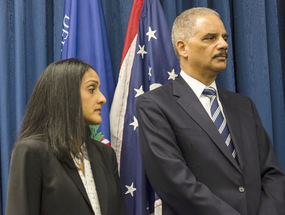
WASHINGTON, D.C. - Indian-American lawyer and civil rights activist Vanita Gupta is leading a Federal probe into the events in Ferguson, Missouri, in which a Grand Jury chose not to indict a white police officer who shot dead an unarmed black teenager. The Obama administration last month appointed Vanita Gupta to head the Justice Department’s Civil Rights Division, which is continuing its probe even after the Grand Jury decision.

Gupta, who was formerly a staff attorney with the American Civil Liberties Union, was already involved in a Ferguson investigation in that capacity when she was named by Attorney General Eric Holder as the acting civil rights division. The division is now spearheading the federal probe.Gupta has a sterling track record of civil rights activism in support of colored people, particularly their high rate of incarceration. When she was barely into her mid-20s and just couple years out of law school, she represented 46 African-Americans who had been convicted by an all-white jury in Texas in 2003 on drug dealing charges.
In the decade since, Gupta has gone on to become one of the best-known civil rights attorneys in the country — leading the charge on prison reform, immigration law, police overreach and other issues.
Now the 39-year-old lawyer, praised as a trailblazer on civil rights issues, is set to play a major role in how the Justice Department proceeds in its in Ferguson. Last month, Attorney General Eric Holder named Gupta as the acting head of the Civil Rights Division at the Justice Department, with the expectation that she will soon be nominated for the job permanently. But it’s how DOJ proceeds in the Ferguson investigation that is sure to be an early test for Gupta. Gupta is already well acquainted with the issues in Ferguson. She was a co-author of a study, launched months earlier, looking into the militarization of local police departments — an issue that garnered new attention after violent protests erupted between the Ferguson Police Department and people angry over the death of Brown. Born in Philadelphia, she spent much of her early childhood in England and France, where her father worked as a business manager for a multinational chemical company.
While she has told reporters that she’s not sure when she developed an interest in social justice issues, she’s also recounted vivid memories of a childhood in which she experienced discrimination firsthand. In one incident in a London restaurant, she and her family, including a grandmother who was visiting from India, were the targets of slurs by skinheads who called them “Pakis” and threw french fries at them until they left. “It was just a very vivid demonstration of what it’s like to grow up as a person of color in a very troubled time,” Gupta told the New York Times in a 2003 profile. She later attended Yale, studying history and women’s studies, prompting her family to tease her about what she was going to do with her life. But that soon became clear to her parents when, in 1996, Gupta, dressed in her graduation gown, skipped her commencement ceremony to demonstrate with Yale employees fighting for fair wages. She later graduated from New York University’s School of Law.
In the decade since, Gupta has gone on to become one of the best-known civil rights attorneys in the country — leading the charge on prison reform, immigration law, police overreach and other issues.
Now the 39-year-old lawyer, praised as a trailblazer on civil rights issues, is set to play a major role in how the Justice Department proceeds in its in Ferguson. Last month, Attorney General Eric Holder named Gupta as the acting head of the Civil Rights Division at the Justice Department, with the expectation that she will soon be nominated for the job permanently. But it’s how DOJ proceeds in the Ferguson investigation that is sure to be an early test for Gupta. Gupta is already well acquainted with the issues in Ferguson. She was a co-author of a study, launched months earlier, looking into the militarization of local police departments — an issue that garnered new attention after violent protests erupted between the Ferguson Police Department and people angry over the death of Brown. Born in Philadelphia, she spent much of her early childhood in England and France, where her father worked as a business manager for a multinational chemical company.
While she has told reporters that she’s not sure when she developed an interest in social justice issues, she’s also recounted vivid memories of a childhood in which she experienced discrimination firsthand. In one incident in a London restaurant, she and her family, including a grandmother who was visiting from India, were the targets of slurs by skinheads who called them “Pakis” and threw french fries at them until they left. “It was just a very vivid demonstration of what it’s like to grow up as a person of color in a very troubled time,” Gupta told the New York Times in a 2003 profile. She later attended Yale, studying history and women’s studies, prompting her family to tease her about what she was going to do with her life. But that soon became clear to her parents when, in 1996, Gupta, dressed in her graduation gown, skipped her commencement ceremony to demonstrate with Yale employees fighting for fair wages. She later graduated from New York University’s School of Law.

 RSS Feed
RSS Feed
